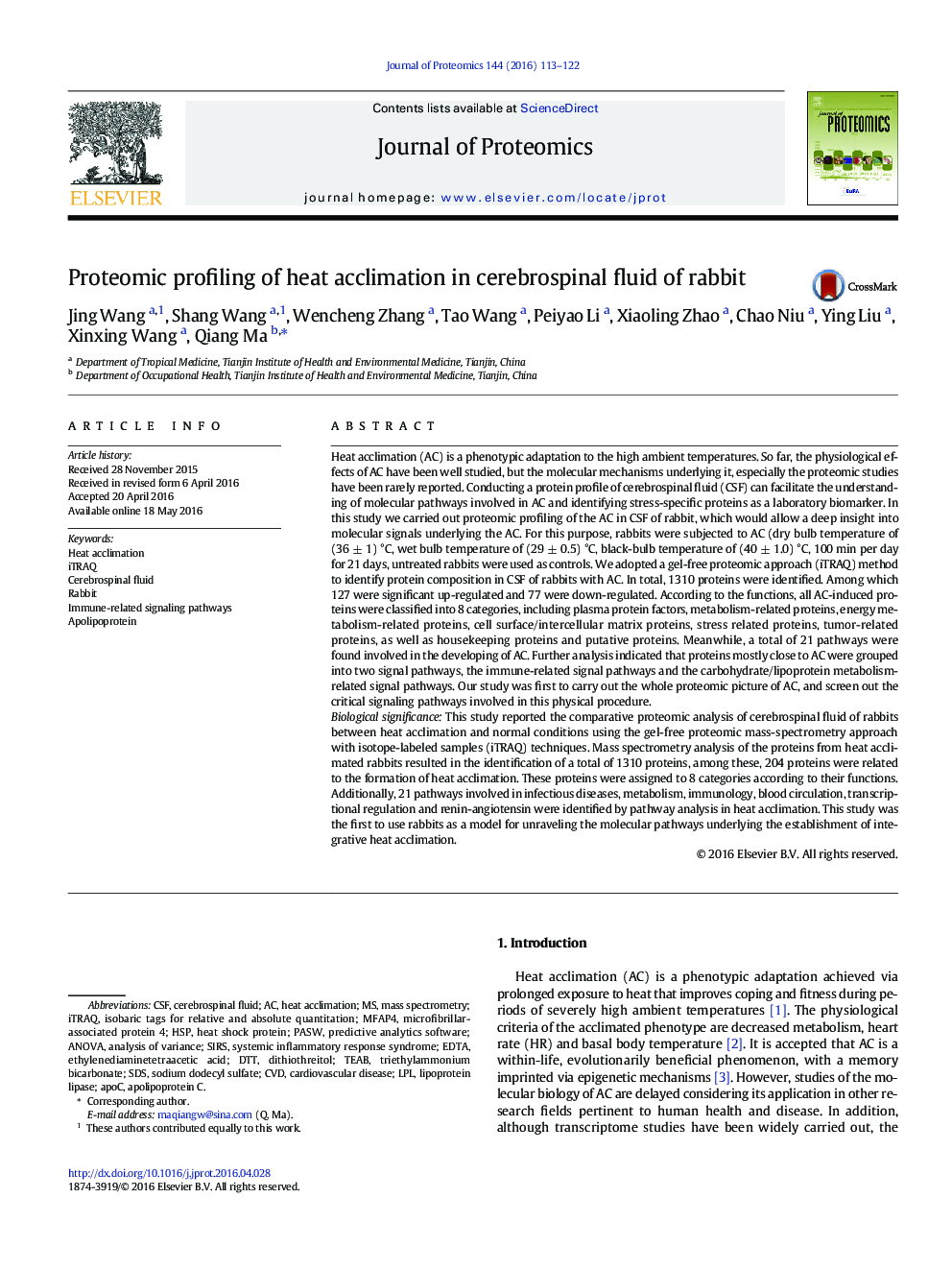| کد مقاله | کد نشریه | سال انتشار | مقاله انگلیسی | نسخه تمام متن |
|---|---|---|---|---|
| 1225129 | 1494737 | 2016 | 10 صفحه PDF | دانلود رایگان |
• First iTRAQ-based study of protein expression in cerebrospinal fluid of heat acclimation rabbits.
• 1310 proteins were identified. Among which 127 were significant up-regulated and 77 were down-regulated.
• Immune-related signaling pathways were found to be stimulated in AC, including stress and inflammatory related proteins.
• Carbohydrate metabolism changes were found in the protein level, which has been done only by transcriptome previously.
• The up-regulation of apolipoprotein family also explained the cardiovascular stimulation and participation during AC.
Heat acclimation (AC) is a phenotypic adaptation to the high ambient temperatures. So far, the physiological effects of AC have been well studied, but the molecular mechanisms underlying it, especially the proteomic studies have been rarely reported. Conducting a protein profile of cerebrospinal fluid (CSF) can facilitate the understanding of molecular pathways involved in AC and identifying stress-specific proteins as a laboratory biomarker. In this study we carried out proteomic profiling of the AC in CSF of rabbit, which would allow a deep insight into molecular signals underlying the AC. For this purpose, rabbits were subjected to AC (dry bulb temperature of (36 ± 1) °C, wet bulb temperature of (29 ± 0.5) °C, black-bulb temperature of (40 ± 1.0) °C, 100 min per day for 21 days, untreated rabbits were used as controls. We adopted a gel-free proteomic approach (iTRAQ) method to identify protein composition in CSF of rabbits with AC. In total, 1310 proteins were identified. Among which 127 were significant up-regulated and 77 were down-regulated. According to the functions, all AC-induced proteins were classified into 8 categories, including plasma protein factors, metabolism-related proteins, energy metabolism-related proteins, cell surface/intercellular matrix proteins, stress related proteins, tumor-related proteins, as well as housekeeping proteins and putative proteins. Meanwhile, a total of 21 pathways were found involved in the developing of AC. Further analysis indicated that proteins mostly close to AC were grouped into two signal pathways, the immune-related signal pathways and the carbohydrate/lipoprotein metabolism-related signal pathways. Our study was first to carry out the whole proteomic picture of AC, and screen out the critical signaling pathways involved in this physical procedure.Biological significanceThis study reported the comparative proteomic analysis of cerebrospinal fluid of rabbits between heat acclimation and normal conditions using the gel-free proteomic mass-spectrometry approach with isotope-labeled samples (iTRAQ) techniques. Mass spectrometry analysis of the proteins from heat acclimated rabbits resulted in the identification of a total of 1310 proteins, among these, 204 proteins were related to the formation of heat acclimation. These proteins were assigned to 8 categories according to their functions. Additionally, 21 pathways involved in infectious diseases, metabolism, immunology, blood circulation, transcriptional regulation and renin-angiotensin were identified by pathway analysis in heat acclimation. This study was the first to use rabbits as a model for unraveling the molecular pathways underlying the establishment of integrative heat acclimation.
First iTRAQ-based study of protein expression in cerebrospinal fluid of heat acclimation rabbit.
► 1310 proteins were identified, 127 were up-regulated and 77 were down-regulated.
► According to the functions, all AC-induced proteins were classified into 8 categories, involved in 21 pathways.
► Screen out the critical signaling pathways involved in this physical procedure.Figure optionsDownload high-quality image (269 K)Download as PowerPoint slide
Journal: Journal of Proteomics - Volume 144, 20 July 2016, Pages 113–122
